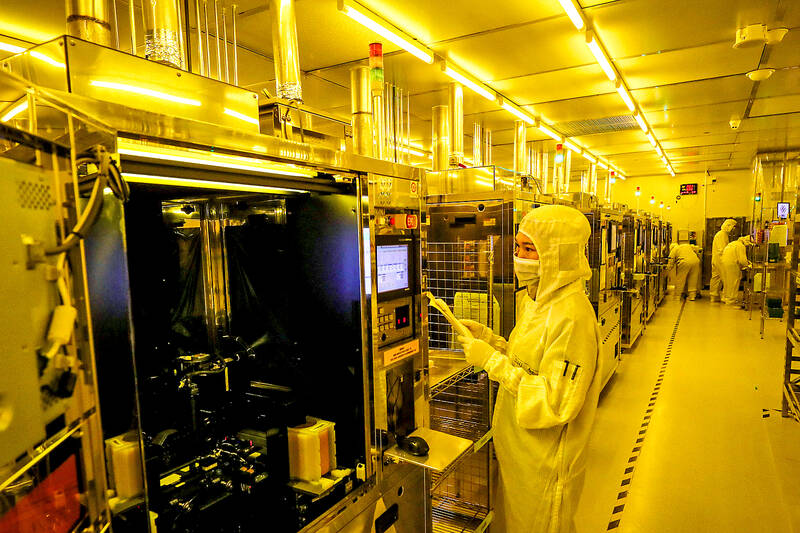Innotron Memory (合肥長鑫), the parent firm of China’s top chipmaker, Changxin Xinqiao Memory Technologies Inc (CXMT, 長鑫存儲), is to invest no less than 17.1 billion yuan (US$2.4 billion) in an advanced packaging plant in Shanghai that could be used to make artificial intelligence (AI) memory.
Innotron signed a contract with the local government this month via a Shanghai subsidiary to secure land, and the new site is expected to start production in mid-2026, official documents published on a Shanghai government website said.
The project would focus on a wide range of packaging technologies, including an advanced process called through-silicon via (TSV) required to make high-bandwidth memory used to power AI applications, one of the documents said. The facility is expected to provide packaging capacity for 30,000 units per month.

Photo: AFP
Innotron earlier this year secured a deal with a number of investors to raise a total of 10.8 billion yuan, according to a March exchange filing from GigaDevice Semiconductor Inc (兆易創新), one of the parties involved.
Innotron plays a critical role in China’s efforts to compete with the US in the emerging AI field, which requires cutting-edge semiconductors. However, China’s chipmaking capabilities have been hampered by a US-led multinational campaign to restrict Beijing’s access to advanced equipment, a sector that is dominated by American, Dutch and Japanese suppliers.
The administration of US President Joe Biden has also banned Nvidia Corp from selling its most cutting-edge AI semiconductors to China, which is depending more on alternative offerings from Huawei Technologies Co (華為). However, it is unclear who is making high-bandwidth memory for Huawei’s AI accelerators.
CXMT started developing chipmaking technologies eight years ago, with patents from now defunct German firm Qimonda AG. It makes chips used in a wide range of products, including computer servers and smart vehicles. It is also trying to develop AI memory, media outlets have reported.
It competes with US-based Micron Technology Inc and South Korea’s Samsung Electronics Co and SK Hynix Inc.
The Innotron subsidiary has drawn US scrutiny, with the Biden administration weighing sanctions against the Chinese chipmaker, Bloomberg News has reported.

MULTIFACETED: A task force has analyzed possible scenarios and created responses to assist domestic industries in dealing with US tariffs, the economics minister said The Executive Yuan is tomorrow to announce countermeasures to US President Donald Trump’s planned reciprocal tariffs, although the details of the plan would not be made public until Monday next week, Minister of Economic Affairs J.W. Kuo (郭智輝) said yesterday. The Cabinet established an economic and trade task force in November last year to deal with US trade and tariff related issues, Kuo told reporters outside the legislature in Taipei. The task force has been analyzing and evaluating all kinds of scenarios to identify suitable responses and determine how best to assist domestic industries in managing the effects of Trump’s tariffs, he

TIGHT-LIPPED: UMC said it had no merger plans at the moment, after Nikkei Asia reported that the firm and GlobalFoundries were considering restarting merger talks United Microelectronics Corp (UMC, 聯電), the world’s No. 4 contract chipmaker, yesterday launched a new US$5 billion 12-inch chip factory in Singapore as part of its latest effort to diversify its manufacturing footprint amid growing geopolitical risks. The new factory, adjacent to UMC’s existing Singapore fab in the Pasir Res Wafer Fab Park, is scheduled to enter volume production next year, utilizing mature 22-nanometer and 28-nanometer process technologies, UMC said in a statement. The company plans to invest US$5 billion during the first phase of the new fab, which would have an installed capacity of 30,000 12-inch wafers per month, it said. The

Taiwan’s official purchasing managers’ index (PMI) last month rose 0.2 percentage points to 54.2, in a second consecutive month of expansion, thanks to front-loading demand intended to avoid potential US tariff hikes, the Chung-Hua Institution for Economic Research (CIER, 中華經濟研究院) said yesterday. While short-term demand appeared robust, uncertainties rose due to US President Donald Trump’s unpredictable trade policy, CIER president Lien Hsien-ming (連賢明) told a news conference in Taipei. Taiwan’s economy this year would be characterized by high-level fluctuations and the volatility would be wilder than most expect, Lien said Demand for electronics, particularly semiconductors, continues to benefit from US technology giants’ effort

‘SWASTICAR’: Tesla CEO Elon Musk’s close association with Donald Trump has prompted opponents to brand him a ‘Nazi’ and resulted in a dramatic drop in sales Demonstrators descended on Tesla Inc dealerships across the US, and in Europe and Canada on Saturday to protest company chief Elon Musk, who has amassed extraordinary power as a top adviser to US President Donald Trump. Waving signs with messages such as “Musk is stealing our money” and “Reclaim our country,” the protests largely took place peacefully following fiery episodes of vandalism on Tesla vehicles, dealerships and other facilities in recent weeks that US officials have denounced as terrorism. Hundreds rallied on Saturday outside the Tesla dealership in Manhattan. Some blasted Musk, the world’s richest man, while others demanded the shuttering of his